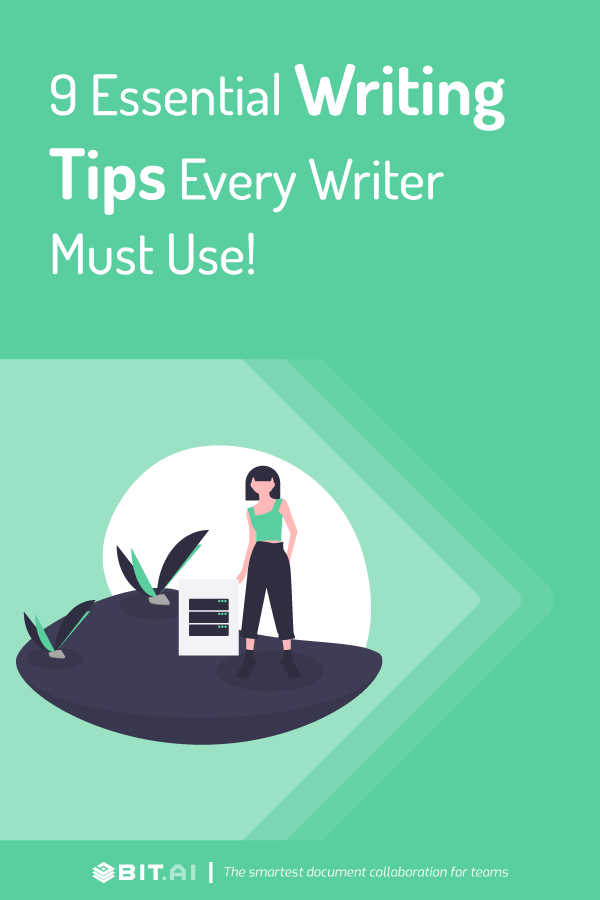The pen is mightier than the sword.
Great writer Edgar Bulwer-Lytton made this powerful observation almost 200 years ago, but it remains just as true today. Writing is one of the most dynamic arts in existence, and a simple tale can change many lives — which is why most of us choose to become writers in the first place.
Writers craft blog posts, research papers, work documents, novels, reports, emails, marketing material, etc. every day. These write-ups represent who they are professionally & personally, and enable them to communicate efficiently!
Writers try new sentences until one captures the essence of their thought. They tweak the display of words to make writing linear, concise, and organized to perfection. They express their ideas in a way that readers are hooked on to their piece of content with full admiration!
However, sometimes even the most polished writers are prone to the occasional gaffe. They might struggle to find the right words to represent their story, loose focus with some types of distraction, or face difficulty while researching their ideas!
So, to make the writing process easier, we’ve curated a list of 9 important writing tips for every writer who wants to hone their craft to excellence and tell their tales successfully to the world through text!
Let’s go!
9 Essential Writing Tips:
1. Read Like a Writer
Stephen King once said,
‘If you don’t have the time to read, then you don’t have the time or tools to write.‘
The best writers are also sharp readers, and reading on a daily basis is the fastest way to develop your writing prowess. Diversify your reading material by exploring your horizons into challenging forms of write-ups beyond the ones you typically read such as blog posts, newspaper articles, etc. Focus on the sentence structure, flow, and word choice.
Make it a habit to carry a book around with you, keep one in your bedroom. Learn to read in sips instead of gulping everything in one go and when you read, read like a writer.
Read more: Best Writing Tools for Creative Writing
2. Choose Simple Words
Do you believe people sound smarter when they use fancy and big words? Well, According to research published in Applied Cognitive Psychology, the answer to this question is- No.
Rather, complex writing styles make them sound small-minded. Consider this title of a study: Repercussion of erudite idiolect utilized irrespective of necessity: Difficulty in using long words needlessly. It does not sound natural, right?
A better title to this study would be something like- The impact of using fancy words when you don’t need them? Write the way you talk. Your writing should sound fluid and natural. If you wish to sound smart, you must stop trying to sound smart! Brilliant writing is simple writing, a basic idea delivered directly and clearly.
3. Do Your Research
Besides, copying the work of someone else, nothing will damage your credibility faster than failing to do your homework properly. Many writers try to take shortcuts with their research in evidently to complete their piece of content.

This can vary from unexpected fudging of a statistic out of the context to being lazy when it comes to attribution or sourcing. This not only will put you in trouble with your editor, content marketing manager, or other bosses but will make you look like an amateur.
Research even helps writers with the following:
- The ability for summarization and categorization
- Critical thinking
- Explanation skills
Read more: Power Words To Make You Stand Out From Competition
4. Set Writing Goals
Are you like every other writer making resolutions to become better at writing by the end of this year? If yes then you are on the right track and how will you measure your growth or success in the field?
Well, the skill of writing can be subjective, and it is tough to know where to start and when to end. It can get hard to hold up work you did a few months ago next to work you did yesterday and recognize much difference.
Still, improvements are possible—especially if you set proper goals to revisit throughout the process or writing.
These goals can be related to:
- Increasing your weekly word count.
- How in-depth you go with the topic.
- Detecting your mistakes and learning from them.
- Whether you provide solutions or just educate your readers about a problem.
- Changes in the tone and writing style.
5. Get Rid of Distractions
This is probably one of the most difficult writing tips to follow — especially for those who enjoy working to and fro, from scrolling Instagram while researching to taking short coffee breaks. “But the more you eliminate distractions, the better and more focused your writing will become.”- state Peter Brook, director of content marketing at Ivory Research.

Such obstructions tend to affect the quality of your work and desist ideas!
Here are some ways to enter a deep focus mode:
- Write on software or tool exclusively made for writing such as Bit.ai.
- Work in a quiet space, like a local library or a locked room.
- Keep your phone to airplane mode or put it in a different room.
- Avoid working with friends or colleagues, unless they really increase your productivity and accountability.
Read more: How To Write A Blog Post Readers Will Love?
6. Write as Often as You Can
This is more of a process-based writing tip. Writing regularly is one of those tips you keep hearing as a writer, that’s because it works!
The best way you’re ever going to finish writing your piece of content is by actually sitting down and writing it- by working on your write-up as often as you can!
Try to write wherever and whenever you find the change — on the bus, waiting for your laundry, in a long line at the grocery store, etc. This will help you achieve the target and practice your writing skills!
“Start writing, no matter what. The water does not flow until the faucet is turned on.”— Louis L’Amour
7. Outlines Are Your Friend
Before putting down a pen on a blank paper, frame an outline of what you researched, and plan to write. It doesn’t have to be complex.
A simple structure of each section presented in a particular order, along with a few sentences about what each section will contain, may be enough.
 Having a well-defined structure before you write is like having a roadmap. Whenever you feel lost, refer back to your roadmap and get back to your kick-ass writing!
Having a well-defined structure before you write is like having a roadmap. Whenever you feel lost, refer back to your roadmap and get back to your kick-ass writing!
8. Keep an Editorial Calendar
An editorial or content calendar is a simple tool to help you keep track of things as you move through your current content plan. Especially when writing blog posts, social media content, or newspaper articles. You can keep an analog editorial calendar or an online one to make deadlines and keep track of your writing goals.
With the editorial calendar you can:
- Get a clear view of your content
- Keep a track of everything
- Strike deadlines more easily
- Plan much farther ahead
- Keep your audience engaged with fresh content
To make the process of writing success, we have a ready-made editorial calendar template for you! Editorial Calendar Template
Read more: How to Create a Content Calendar?
9. Learn to Self-Edit
Writing skills and editing skills are two entirely different concepts. However, you must approach your write-up with critical and analytical vision.
With that being said, every writer, author, and blogger must learn the basics of self-editing. The best writing and editing software with grammar checks such as Bit.ai and Grammarly can help you get started. Read each sentence aloud, and check the transitions between the paragraphs.
“The first draft reveals the art; revision reveals the artist.”― Michael Lee
This writing tip will assist you in identifying the flow, tone of the language, and fix mistakes in your work quickly. You can even create a self-editing checklist that helps you fix common writing errors.
Over to You!
To get your readers hooked to your writing, do not think about content alone. Think about how you will research it. Think about how you will write it and lastly, think about how will you edit it. Keep in mind that brilliant writing isn’t anything fancy, it’s more about how you present the point of view clearly!
Today, “best” should be your focus when writing a piece of content. You can move the world with your words and we hope these tips will guide you through the process! Cheers!
Further reads:
- 8 Best Writing apps To Make You A Better Writer
- Article Spinner: Definition, Purpose & Tools!
- Top 9 Writing Checkers Every Writer Should Use!
- 9 Best Paraphrasing Tools In 2022 (Free & Paid)
- 11 Best Free Plagiarism Checker for Writers!
- 11 Grammarly Alternatives and Competitors You Must Know!
- 10 Best Apps for Writing a Book
- Best Diary and Journal Apps for 2022
- The 5 Best eBook Creators

Related posts
About Bit.ai
Bit.ai is the essential next-gen workplace and document collaboration platform. that helps teams share knowledge by connecting any type of digital content. With this intuitive, cloud-based solution, anyone can work visually and collaborate in real-time while creating internal notes, team projects, knowledge bases, client-facing content, and more.
The smartest online Google Docs and Word alternative, Bit.ai is used in over 100 countries by professionals everywhere, from IT teams creating internal documentation and knowledge bases, to sales and marketing teams sharing client materials and client portals.
👉👉Click Here to Check out Bit.ai.



